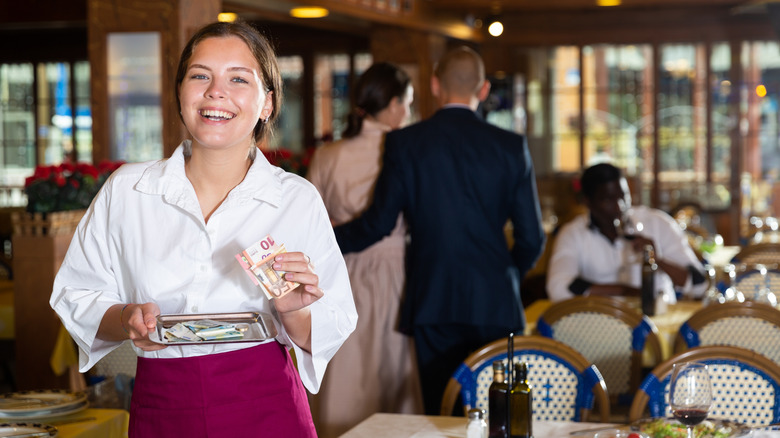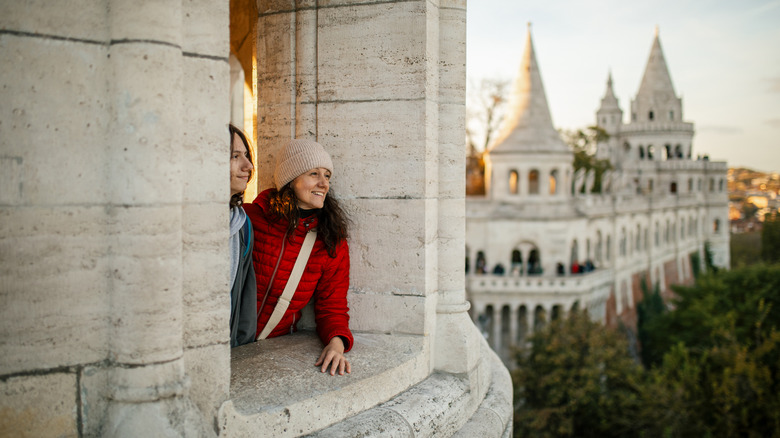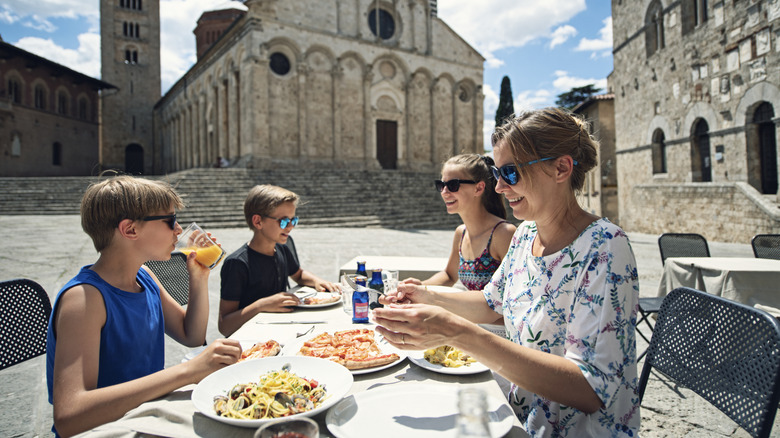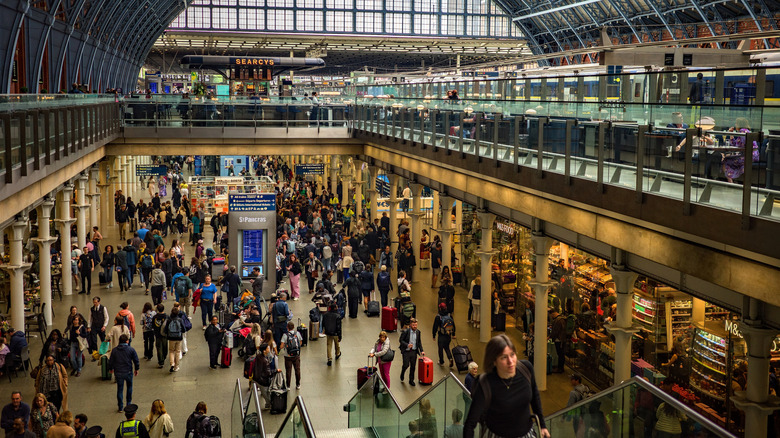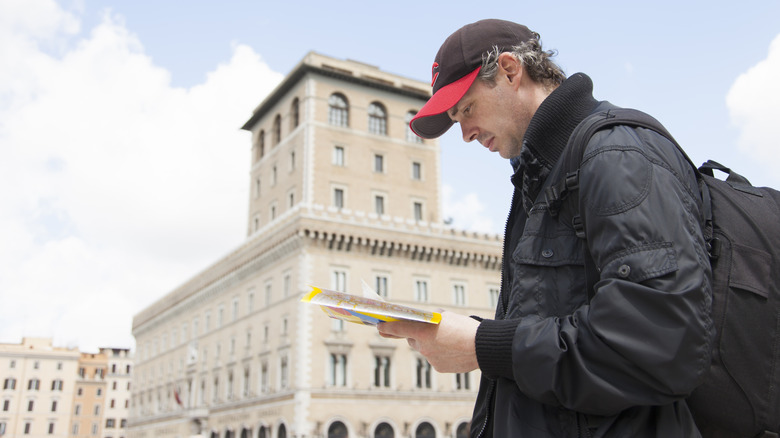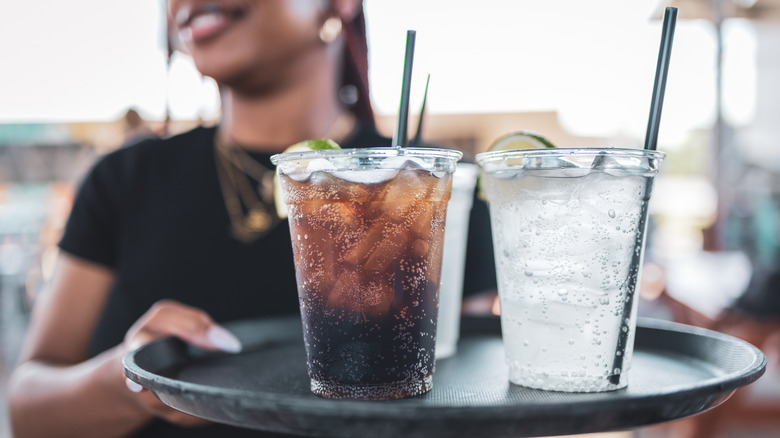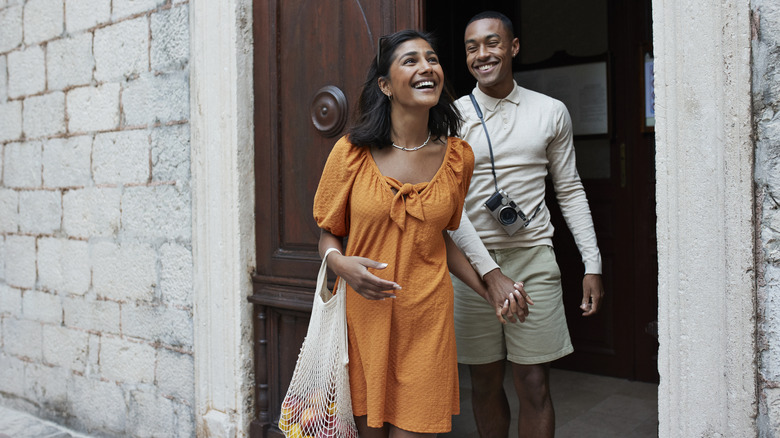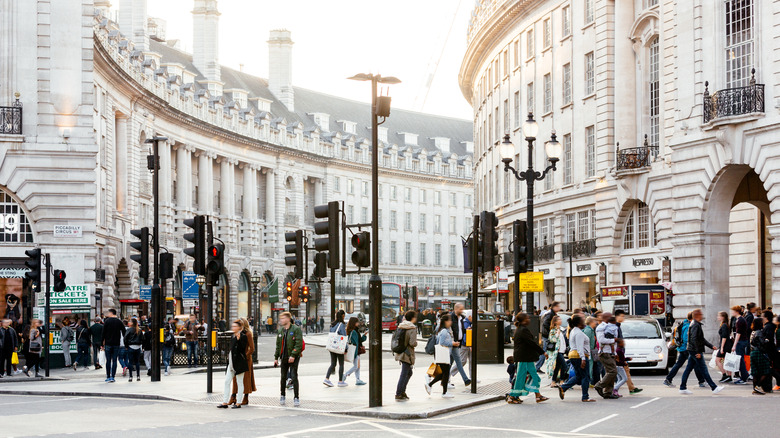Unexpected Traits That Europeans Always Notice About American Tourists
While generalizations are a little unfair, there are often traits that people from the same country share — or at least they are perceived to share them. Americans, and how they are viewed when abroad, are no different. But what exactly do residents of other countries, and Europe in particular, think of American tourists? Is it mostly good, bad, or a mix of the two? These are certainly points worth considering, since Americans are a huge contributor to the tourism industry of Europe, a continent that boasts the world's oldest country.
In 2023 alone, more than 20 million Americans took a trip to Europe, stopping by such sites as St. Mark's Square in Venice, Buckingham Palace in London, the Eiffel Tower in Paris, and many more. While many residents of Europe might not encounter U.S. tourists at all, others have frequent interactions with them, and they tend to formulate a picture of some of the characteristics of their stateside visitors. We've looked at forums like Reddit and blogs to get a sense of what Europeans think of American tourists. If you're planning your first trip to Europe, these pointers are certainly worth digesting.
They are loud
This might not be unexpected, but it's still worth mentioning. Americans get a rap, whether warranted or not, for being loud. How noisy, you say? Think loud enough that you can hear them speaking from down the block or clearly from five aisles away in a supermarket. As someone from Finland noted on Reddit, "Their default volume setting is admittedly higher than that of an average Finn." While the volume that most Americans speak in their daily lives might feel totally natural when at home, when in Europe, that decibel level is the exception, not the norm.
As a general rule, Europeans tend to be a little more reserved when talking in public. Often, you might not even be able to hear what people on the table next to you are saying when you are eating in a restaurant in Europe. Compare that with the average restaurant in the U.S., when you can clearly hear full conversations from a few tables away. If you find yourself noticing people around you speaking in hushed tones, use that as a benchmark for the level of projection you should aim for yourself.
They are confident and energetic
This attribute is, in a sense, tangentially related to the previous trait of being loud. Energy and confidence aren't typically associated with people who are quiet or timid, so "loud Americans" can also be another way of saying they are assertive. Compared to tourists from other countries, Americans tend to wander around new areas with an assured sense, and with lots of positive energy. This doesn't just extend to the way they speak, but also in their general demeanor, the way they carry themselves, as one European commenter on Reddit pointed out. "I wonder how they have so much social energy and self-confidence. It's visible in their moves, gestures, mannerisms, and intonation. Compared to them, I feel lifeless, almost like a zombie," they wrote.
Many travelers venture around a new city or destination with a little hesitation because they aren't familiar with the surroundings, or the normal social rhythm of the streets. Americans, however tend not to hold back, they walk around as though they feel quite at home in a place, even if it's their first time there. They also tend to be very upbeat, and as a whole, some Europeans find them easy people in which to strike up a conversation.
They like immediate solutions
The British have a saying about keeping a "stiff upper lip." What that means is that even when things go wrong, they don't complain or whine about it, but take it in their stride without betraying any feelings or emotions. This trait can be found, in degrees, across Europe. In fact, Europeans have a tendency to put up with things that are broken, don't work, or are not ideal. By the same token, Europeans have a sense that Americans want any problems that arise to be fixed pronto.
A European contributor on Reddit described this sentiment, writing, "Having +4 floor buildings with no elevator or air conditioning isn't that strange in many European countries. Our housing tends to be way smaller. And that's OK. We adapt. We don't need our discomfort to be solved or treated the second we experience it." If a room in a hotel is too cold, or too warm, or an entree takes too long to come to the table, a European guest might just suck it up, and move on. But an American traveler is thought of as quickly voicing their dissatisfaction, and demanding some sort of remedy on the spot.
They are generous tippers
Unlike in the United States, where tipping is an intrinsic part of hospitality, it's not so common, nor expected, across Europe. It also varies from country to country across the continent, and in some places, it's quite common to not tip at all. In a restaurant in Europe, for example, tips in the range of 5-10% of the bill are quite standard, significantly lower than the 15-20% average in the U.S. Taxi drivers in the United Kingdom are also used to not being tipped at all as it's not an expected part of the daily transactions when collecting a fare.
But even given all that, Americans have this built-in mechanism that they need to tip everyone, as a way to show their appreciation. Thanks to this, they tend to tip more and more frequently than their European counterparts, not just at home but also abroad. As a result, Americans have gained a reputation for being generous. However, they also expect good service — mediocre service just won't do — and if they get it, they tip well.
They connect with strangers
If there is a room full of people from around the world, and some of them are Americans, chances are that the Americans will be speaking, or trying to make conversation. Travelers around the world will know that Americans are great at making small talk with total strangers, and they often do it in a warm, welcoming manner, with a smile on their face. As one Reddit user explained, "They enjoy making small talk and are genuinely interested in knowing about others, and their politeness doesn't sound ironic."
Some of the lines of conversation might be where a person is from, or the history of a site, and sometimes they will try to connect with locals by saying how their ancestors are from the country they are visiting. While this might seem, to the American, as a way to find some common ground between themselves and people in the destination, some Europeans couldn't care less. Like this contributor on Reddit who wrote, "I just don't like it when they try and tell me things about my culture because their great grandfather's third cousin's boyfriend's dog was Irish."
They are filled with wonder
As global history goes, the United States would have to consider itself as a relatively young nation, one whose past is only a few hundred years old. The oldest buildings in the country, for instance, date to the 1600s, a time when the British held dominion over these lands. That's why, when Americans see something that has been around since Medieval times — as is the case with many buildings across Europe — they are often filled with awe. There are castles around the continent that have stood for many centuries, and even a gorgeous church in France that can trace its genesis back to the year 961.
Just think about the most famous painting in the world, the Mona Lisa, which was painted more than 250 years before America gained independence. Then there is the excitement derived from the differences between each country, in terms of customs, food, and language. The U.S. might be a huge country, but across its broad land, people communicate primarily in English. In Europe, a traveler can travel a few miles in one direction, cross over a border seamlessly, and encounter people speaking an entirely different language than that of the neighboring nation. That, in itself, is a pretty remarkable thing to experience.
They love to eat
It's a staple of main streets up and down most countries, a beloved institution popular with many diners — the homey Italian restaurant. You'll also find French, Spanish, Greek, and many other cuisines represented around the U.S., and many Americans have their own favorite spot they speak of in tones of admiration and benevolence. While many of these restaurants serve fabulous fare, can they ever really compete with the food served in their country of origin? What many Americans appreciate about a trip to Europe is the variety of food within the continent, and the freshness of each dish. There are also many places to eat in Europe if you are on a shoestring budget.
"French, Italian, Spanish etc. food in Europe is excellent. I've even had spectacular Italian food in Germany," explained a commenter on Reddit. How many times have you heard a friend or family member come back from a trip to Europe and beam about the food? From grilled fish at a taverna on the Greek isles and a tiramisu in Venice to a paella in Valencia and a bouillabaisse in the South of France, the food is a memory that lasts far beyond the trip.
They have difficulties with personal boundaries
It might be hard to believe, but the United States and Europe are about the same size (Europe is marginally bigger). Where there is a major difference between the two is that Europe's population is about double that of the U.S. Realistically, this means that for every piece of space in Europe, whether that is the tight halls of a gallery in Florence, or the rolling hills of northern England, there are twice as many people in that space as there would be in America.
So, European spaces can feel relatively smaller, with more people in close proximity, and Americans, who are accustomed to having plenty of room around them, can sometimes feel uncomfortable in such cramped confines. They can actually get offended or feel stressed by being so close to strangers. While this isn't unique to Americans traveling in Europe — it's also commonplace when Americans visit Asia as well — it is worth mentioning since so many Americans visit the continent across the north Atlantic each year.
They expect everyone to converse in English
While statistics by the U.S. Census Bureau show that one in five Americans can speak another language, the vast majority are only fluent in one tongue. With English being the main medium of communication in the U.S., it's the language that many Americans traveling overseas will feel most comfortable using. So much so that they expect other people to speak it also, even when they are in remote areas away from main tourist hubs. Even if English is possibly the most international language on the planet — it's the language of choice for pilots across the world, for instance — it's not universally spoken around the globe.
There are cities all across Europe, and certainly small towns and villages, where the locals don't speak a lick of English. That's not surprising since English is of no use to them in their daily lives. Yes, most Europeans learn English at school, but like any language, if you don't use it, you lose it. Plus, American travelers should not assume the locals speak English. A much smarter choice is to learn some of the language spoken in the country you will be visiting, like these common Spanish phrases that will help your next trip to Spain. Not only will it show that you appreciate the local culture, it's also a good workout for the brain.
They love to wear merch
For some Europeans, Americans can easily be identified before they even open their mouths. That is because they are often wearing very a specific combination of clothes, almost like a uniform of sorts, even when they travel overseas to regions like Europe. The look usually starts with a T-shirt or hoodie that is branded or displays their home city or the college where they studied.
If the U.S. visitor is exploring a warm destination, the American might well be wearing cargo or denim shorts, and their head will be topped with a baseball cap. On their feet, sneakers and possibly white socks, sometimes pulled up past the ankles, round out the runway look. Of course not all Americans dress this way, much as the same way that not all French people wear berets. But clearly enough of them do to make this a detectable sartorial set-up. Changing the way you dress might help you to not be viewed as an "ugly" tourist.
They speak their mind
The well-worn adage that the customer is always right has become an anchoring tenet in America's hospitality and retail businesses. In practical terms, if a customer is unhappy with something, they will voice their dissatisfaction. For Europeans, there is a sense that Americans are not shy about speaking their mind and righting what they see as a wrong, even if it's not necessarily what the Europeans would do.
This could be anything from their hotel room not being large enough for their tastes, to not being able to get their favorite food snacks at the grocery stores. It might, most obviously, be apparent at a restaurant, where Americans expect a certain snappy level of service, something that isn't always automatically found in Europe. Whether this view of Americans might be largely anecdotal, and certainly not representative of all Americans, it's a popular opinion held by Europeans.
They love ice in their drinks
When Americans order a soda on a sizzling summer's day, chances are that the cup is filled to the brim with ice. There is often more ice in the cup than the drink itself, and this bonanza of ice in a chilled drink has now become the norm. In Europe, locals wouldn't dream of putting ice in their wine. They'd most likely wait for it to be properly chilled, or make do with it at the temperature it's served.
But four in 10 Americans will put ice in their wine, and this isn't a common sight in Europe among locals. The prevalence of bucket-loads of ice in drinks across Europe is somewhat of a rarity, and often when Americans order ice for their beverage, they will receive only a cube or two. Since this is usually not enough to assuage their burning desire to have their taste buds chilled, American visitors will request more, leading to the perception that they have a soft spot for ice, and lots of it.
They are often in a rush
It's a classic image many of us picture when thinking about Europe: a street-side café, with tables outside, and people sitting, either alone or with a friend, shooting the breeze while they linger over a short, squat cup of coffee. This image isn't just a figment of our imagination. Indeed, many Europeans will spend serious amounts of time at a café every day, just letting the world pass by as they enjoy a drink, or a bite to eat. For Americans, who have been inculcated with the notion that time is money, such luxury of leisure is viewed as an aberration.
You are more likely to see Americans with coffee taken to go, maybe in a disposable paper cup with a plastic lid, than observe them taking their time over a brew at a café. Americans are constantly on the move, and time spent sitting while gently nursing a warm drink is viewed as time taken away from seeing or doing something constructive. Of course, the passive indulgence of just hanging out in a café and watching humanity exercise its quotidian routine can be as rewarding an experience as visiting a major tourist site. But Americans aren't wired to just unwind, or sit back and smell the coffee, literally.
They are surprised by European hours
Let's be honest, shoppers in America are spoiled. We can visit stores at all hours of the day or night to get our daily necessities, and even when grocery stores are closed, there are often 24-hour gas stations that stock everything from hot meals and snacks to cell-phone chargers. There are also fast-food restaurants open for extended hours, and while they might not offer the most healthy meal options, they always welcome diners when other establishments tend to be shut.
In Europe, the allegiance to consumerism is much more limited. Stores tend to open up later and close earlier than many Americans are used to back home. On Sundays, a day that remains sacrosanct across a continent that is largely Christian, some shops may stay closed all day. What this means is that Americans need to plan a little better if they want to purchase items, especially an impulse buy late in the evening or on a Sunday. If they don't, they might need to be prepared to be disappointed.




